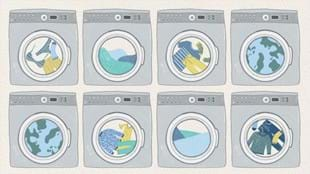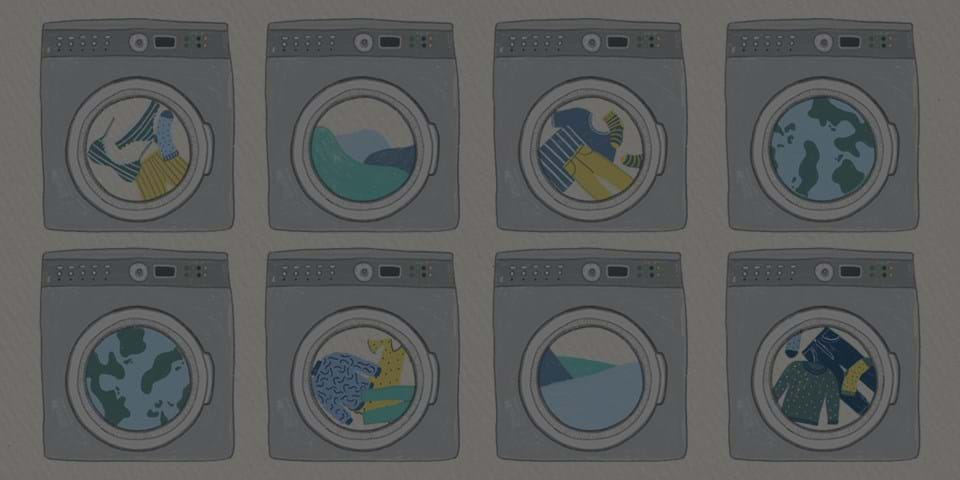Recently in Fit Planet we interviewed ecologist Mark Browne, who, after examining shorelines around the world, found that most of the plastics ending up in our seas were not from plastic bags, but from polyester clothes – thousands upon thousands of microfibers that were literally coming out in the wash.
However, as Browne pointed out, switching to natural fibers that might biodegrade over time won’t necessarily reduce the environmental impact of your clothes.
Applying an ethical framework to your wardrobe is complicated. You need to think about the conditions in which the people making your clothes worked, the resources used to produce the clothes, and where all those clothes (and their microfibers) end up. The good news is that there is one easy way to reduce the environmental impact of your clothes; wash them less often.
Seriously. This is the argument made by Tullia Jack, who’s doing a PhD at Lund University in Sweden, where she’s investigating contemporary laundry conventions.
Jack became interested in modern clothes-washing habits and their environmental consequences when she was doing her masters degree at Melbourne University. “I had planned to write my thesis on sustainable fashion, but a few months and quite a few books into it I found more and more literature suggesting that the use-phase of fashion has the biggest environmental impact,” she says. “Washing, drying, ironing are the big environmental strains, even bigger than farming, chemical dying and transport, although these processes are also heavily taxing on the environment.”
In an early study, Jack asked 30 participants (31 including herself) to wear a pair of jeans at least five times a week for three months. At the end of the three months she found the jeans didn’t smell – smells could be managed by airing them regularly – and most stains removed by spot cleaning. “We experienced first-hand that the jeans did not become socially challenging: they weren’t visibly dirty and they didn’t get smelly.”
The study wasn’t aimed to convince us that we can get away without washing our jeans for three months, but to encourage participants to reflect on their washing habits – something most of us don’t often think about.
It’s true that washing machines are more efficient than they used to be. There have also been effective campaigns aimed at encouraging consumers to wash clothes at 30°C rather than at higher temperatures, which uses much less energy. There have been considerable energy savings in the average washing cycle in the UK, but overall the energy used is increasing – because we’re washing more than ever.
The Energy Saving Trust reports that the average UK household now puts a wash through about five times per week. It calculated that people would be spending up to £130 a year just keeping their clothes clean, excluding the cost of the detergent.
Researchers at the University of Manchester found that people typically wear things once or twice before throwing them in the laundry basket, and would do a load of washing when the load basket was full.
They suggested that we’re also washing more partly because of the vogue for separating laundry, the bed sheets from underwear, whites from colors and so on – the result being that we use smaller loads, but wash more often. This might keep your whites whiter, but it’s not good for energy and water consumption. The increase in energy use could also be put down to the fact that most households have tumble dryers, so we don’t even need to wait for a sunny day to do the laundry.
The researchers also found that most respondents agreed with the statement that “clean laundry smells like the laundry products used in the wash”. Which suggests that in order to appear clean, we want to smell clean, and smelling clean means smelling like laundry detergent. Do you really need to smell like laundry detergent?
Are we losing our ability to distinguish the dirty from the clean, or less inclined to bother? Well, it’s often easier to put something in the laundry basket rather than folding it up and putting it away, isn’t it?
And washing is so easy now that most of us (in the West) have modern washing machines and tumble dryers in our homes.
“Yes, I would say that convenience is a big part of it, but I think it's just so ingrained into our routines,” says Jack. “It would require much less elbow grease to just fold our clothes and put them away after wearing than washing, even with the latest fancy technological machines.”
“I think there is some, not phobia, but dis-ease, about not meeting some unspoken minimum requirement and being seen as 'dirty'. But I think screw it, I'd rather not ravage the environment than be judged by some cleaning despot.”
So would washing your clothes less often – when they’re actually dirty, or smelly – really reduce your environmental footprint? “Absolutely,” says Jack. “You save energy, water and chemicals straight away. Not to mention time as well. You could read a book or go for a walk instead. It’s a win-win situation.”







